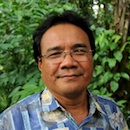
Mangroves, tidal marshes, seagrass, seaweed as well as other coastal and marine ecosystems capture and store large amounts of organic carbon – regularly outdoing the sequestration capacity of standing forests.
Evocatively dubbed ‘blue carbon’, these ecosystems, if protected and restored, hold exciting potential for wetland-rich countries to meet their national climate goals.
Conversely, their continued degradation will release large amounts of carbon dioxide into the atmosphere, posing an outsize threat to mitigation efforts. Destroying blue carbon stores can also worsen climate impacts and hinder adaptation measures, for example by increasing coastal communities’ exposure to storm surges and sea level rise after the felling of mangrove forests.
Many landowners and entrepreneurs have already expressed interest in investing in blue carbon projects, including in Indonesia, where the carbon market has just been launched and is currently being formalized. Indonesia also has the largest area of mangrove forest of any country in the world.
Blue carbon credits will likely enter national and voluntary carbon marketplaces in the years to come.
Such interest is timely. About three-quarters of the world’s mangroves are concentrated in just 15 countries, and less than 7 percent of them are protected; land-use change for aquaculture and coastal development put pressure on those that remain. Seagrass meadows, meanwhile, are sensitive to disturbance and are easily degraded by water pollution, and tidal marshes continue to be drained for development.

CIFOR-ICRAF researchers carry out carbon stocks measurement and Rod Surface Elevation Table (RSET) installation in an Indonesian mangrove forest. Photo by Aulia Erlangga/CIFOR-ICRAF
To counter the rapidly escalating threats to these fragile and under-researched ecosystems – and to make sure that their carbon sequestration is accurately and transparently accounted for – we urgently need to advance our understanding of them, through knowledge-sharing and collaboration. There is still a dearth of research in this area compared with other forest ecosystems.
That’s why we have launched the Blue Carbon Deck, a Transformative Partnership Platform (TPP) hosted by the Center for International Forestry Research and World Agroforestry ( CIFOR-ICRAF ).
The platform brings together various initiatives focused on blue carbon, and aims to become the primary resource for researchers, civil society, and practitioners working in coastal communities. It seeks to ensure that programmes and projects are guided by the latest science, while maintaining a focus on the particular challenges faced by people and biodiversity of foundation ecosystems.
Through the Blue Carbon Deck, scientists can engage in open and honest dialogue with the policy community, enabling policy-relevant research to thrive and evidence-based decisions to be adopted. Likewise, the platform facilitates partnerships with the business community, driving economic prosperity for coastal communities – a critical piece of the puzzle for more sustainable management.
Acknowledgements
Building on over a decade of pioneering research conducted under the Sustainable Wetlands Adaptation and Mitigation Program (SWAMP), funded by the United States Agency for International Development (USAID), the Blue Carbon TPP has evolved through a longstanding collaboration between CIFOR-ICRAF and the United States Forest Service.
We want you to share Forests News content, which is licensed under Creative Commons Attribution-NonCommercial-ShareAlike 4.0 International (CC BY-NC-SA 4.0). This means you are free to redistribute our material for non-commercial purposes. All we ask is that you give Forests News appropriate credit and link to the original Forests News content, indicate if changes were made, and distribute your contributions under the same Creative Commons license. You must notify Forests News if you repost, reprint or reuse our materials by contacting forestsnews@cifor-icraf.org.












